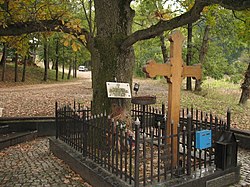From Wikipedia, the free encyclopedia
Oak forest near Velika Plana, Serbia
Radovanje Grove (Serbian : Радовањски луг / Radovanjski lug ) is an oak forest located near Radovanje , Serbia . It is a natural memorial monument that covers 46 hectares (0.46 km2 ). It was first marked during the reign of Alexander Karađorđević, Prince of Serbia , and a memorial church dedicated to Karađorđe was built in 1936. It was categorized as Immovable Cultural Heritage of Exceptional Importance in 1979.[ 1] [ 2]
Returning from exile in Russia in 1817, Karađorđe Petrović as leader of the First Serbian Uprising and Revolutionary Serbia , and his companion Naum Krnar stayed at a field hut owned by Dragić Vojkić in Radovanje Grove, in the Radovanje village. However, Miloš Obrenović I who had come to an arrangement with the Ottoman Turks as leader of the semi-autonomous Principality of Serbia , ordered for Karađorđe and Krnar to be assassinated. Nikola Novaković, a confidant of Vujica Vulićević , cut off Karađorđe's head with a yatagan , and killed Krnar with a shotgun. He buried them, both headless in a grave 100 feet away from the hut to the stream, and their heads, skinless and stuffed , were sent to Istanbul in order to prove to the Ottomans that the two were dead.[ 1]
The place of the assassination is marked by a large wooden cross with marble slab with text. Memorial church dedicated to Karađorđe was built in the 1936.[ 1]
Archaeological Sites Cultural Monuments
St. Achillius Dositej's Lyceum Residence of Princess Ljubica Belgrade Fortress Captain Miša Mansion Belgrade Cathedral Museum of 4 July Secret Partisan Print Shop Residence of Prince Miloš
Pokajnica Golubac Fortress Takovo complex Manasija Tabula Traiana Kragujevac District Courthouse House of Svetozar Marković Sobrašice of Lužnice Žiča Studenica Maglič Lazarica with Kruševac Fortress St. Nicholas Monastery Holy Mother of God, Kuršumlija Lazarevac Memorial Church Mačkov Kamen complexDespot Stefan Memorial Hajduk Veljko's Powder Magazine Early Byzantine Tomb Skull Tower Niš concentration camp Đurđevi Stupovi Petrova Church Sopoćani Stari Ras Hristić family House Banja Monastery Mileševa Partisan Hospital, Prijepolje St. Peter and Paul 's in Gornja Dobrinja Gradac Monastery Kalenić Smederevo Fortress Museum of 1941 Uprising Partisan printing house "Borba" Headquarters of the Main People's Liberation Committee of Serbia Plant nursery, Užice Partisan Hospital, Krčagovo Kadinjača Stari Han Oplenac Ljubostinja Ravanica House of Dimitrije Tucović Atenica Wine cellar Prnjavor Memorial Chapel Wooden Church, Dub St. Peter and Paul's in Sirogojno
Monument to the Unknown Hero Prohor Pčinjski Bođani Monastery Bač Franciscan Church Dunđerski Palace Neštin House Bački Petrovac House Beočin Monastery Rakovac Monastery Šlajz Bishop's palace, Vršac Mesić Monastery Vojinović Bridge Medieval palace of Vučitrn Monastery of St Barbara Danilović House Hadum mosque Orthodox Church in Čurug St. Nicholas', Stari Slankamen Velika Remeta Vrdnik-Ravanica Grgeteg Monastery Jazak Monastery Mala Remeta Candlemas Church, Krušedol Selo Krušedol Monastery Novo Hopovo Staro Hopovo Gorioč Our Lady of Hvosno St. John's, Crkolez St. Nicholas', Đurakovac St. Nicholas', Kikinda Suvača Orthodox Church in Mokrin Churches in White Drin valley
Romanian Church in Uzdin Holy Thetokos', Vaganeš Ubožac (Rđavac) Presentation of Mary, Lipljan Arača Almaška Church Church of The Assumption, Novi Sad Novo Brdo St. Nicholas', Velika Hoča St. John's, Velika Hoča Vojlovica Transfiguration Church, Pančevo Transfiguration Church, Budisavci Bajrakli Mosque St. Jeremiah's, Goraždevac Warehouses of Karlovčić Ogar House St. Luke's, Kupinovo St. Nicholas', Sibač Kaljaja St. Peter of Koriša Holy Salvation, Prizren St. Nicholas', Prizren Churches of Sredačka Župa
Sinan Pasha Mosque Hammam of Prizren Imperial Mosque St. John's, Sombor Devič Divša Kuveždin Petkovica Monastery Warehouses of Golubinci Šišatovac Old St. Stephen's, Sremska Mitrovica Patriarchate of Karlovci Saint Nicholas', Sremski Karlovci Subotica Synagogue Subotica City Hall Virgin Hodegetria, Mušutište St. George's, Rečane Catholic Church of Čoka Orthodox Church of Vilovo Zvečan Fortress Sokolica Monuments of Nerodimlje
Churches of Sirinićka Župa
Privina Glava Orthodox Church of Molovin Holy Archangels Gračanica Visoki Dečani Our Lady of Ljeviš Patriarchate of Peć Banjska Monastery Terzijski Bridge Miloš Obrenović's House Historic Landmarks Spatial Cultural-Historical Units


